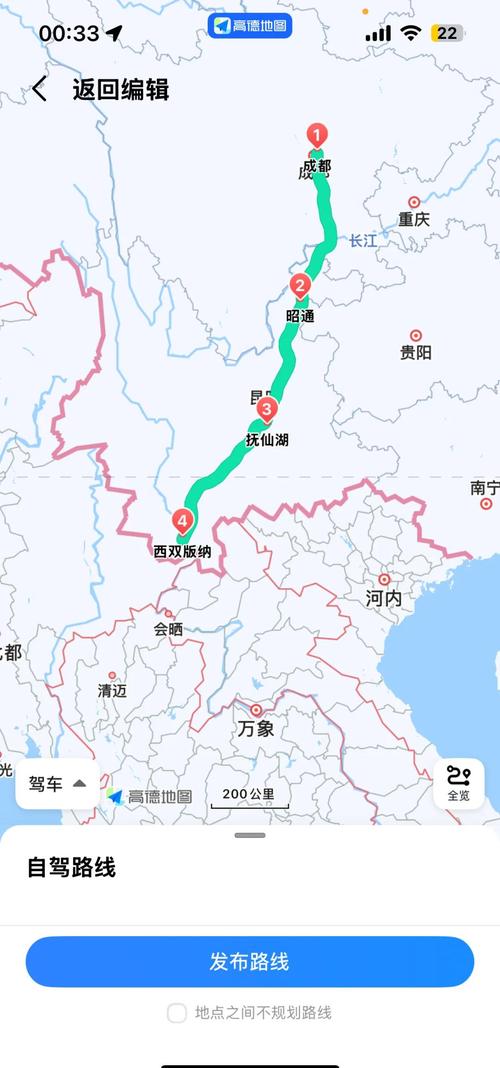【成都 → 西双版纳】全景自驾游攻略
从天府之国到热带雨林,这是一场跨越千里的视觉与味觉盛宴,全程约1800公里,路况以高速为主,非常适合自驾,整个行程可以设计为 “经典7日游” 或 “深度10日游”,以下以经典7日游为主线,并深度10日游作为补充。

(图片来源网络,侵删)
行前准备
车辆准备
- 车辆选择: 建议选择SUV或底盘较高的轿车,成都到版纳一路多山路和隧道,SUV通过性和舒适性更佳。
- 车辆检查: 出发前务必进行全面检查,包括轮胎(备胎)、刹车、机油、冷却液、灯光等。
- 必备物品: 备用钥匙、拖车绳、搭电线、便携式充气泵、灭火器。
驾驶员准备
- 证件: 驾驶证、行驶证、身份证。
- 人员: 确保驾驶员有长途驾驶经验,最好有2-3名驾驶员轮换,避免疲劳驾驶。
- 驾驶时间: 单日驾驶时间建议不超过8小时,安全第一。
物品准备
- 衣物: 成都出发时天气较凉,可带外套,进入云南后,短袖、短裤、裙子即可,但早晚温差大,尤其在高海拔地区(如大理、丽江),务必带一件薄外套或抓绒。
- 防晒: 高倍防晒霜、太阳镜、遮阳帽、防晒衣(云南紫外线非常强)。
- 药品: 感冒药、肠胃药、晕车药、创可贴、防蚊虫叮咬的药(花露水、风油精)。
- 其他: 充电宝、相机、少量现金(部分偏远地区信号不好)、保温杯。
路线规划与时间安排
【经典7日游】快节奏,主打核心景点
这条路线结合了云南的经典风光和最终的热带雨林目的地,体验丰富。
-
Day 1: 成都 → 雅安 → 西昌 (约450km, 6-7小时)
- 路线: 成都市区 → 京昆高速(G5) → 雅康高速(G4218) → 雅西高速 → 西昌。
- 亮点: 体验“天梯高速”的壮丽,穿越二郎山隧道,欣赏大渡河峡谷风光,傍晚抵达“月亮城”西昌,可以去邛海湿地公园散步,感受高原湖泊的宁静。
- 住宿: 西昌市区酒店。
-
Day 2: 西昌 → 大理 (约280km, 3.5-4小时)
- 路线: 西昌 → 京昆高速(G5) → 大理。
- 亮点: 上午可以逛逛西昌市区,感受彝族风情,下午驱车前往大理,苍山洱海的美景将映入眼帘,傍晚可以在大理古城或双廊古镇闲逛,品尝大理特色美食。
- 住宿: 大理古城或双廊古镇客栈。
-
Day 3: 大理一日游 (自由安排)
 (图片来源网络,侵删)
(图片来源网络,侵删)- 玩法: 今天可以不赶路,深度体验大理。
- A线(经典): 环游洱海(租电动车或小电驴),途径喜洲古镇、海舌公园、小普陀等。
- B线(文艺): 登苍山,坐感通索道或洗马潭索道,俯瞰洱海全景。
- C线(休闲): 在大理古城发发呆,找家咖啡馆坐一下午。
- 住宿: 大理。
- 玩法: 今天可以不赶路,深度体验大理。
-
Day 4: 大理 → 普者黑 (约400km, 5-6小时)
- 路线: 大理 → 保山高速 → 普宣高速 → 普者黑。
- 亮点: 告别大理,驱车前往《三生三世十里桃花》的取景地——普者黑,这里是一片喀斯特地貌的田园风光,乘船穿行于荷花丛中,非常惬意。
- 住宿: 普者黑景区内或附近的特色民宿。
-
Day 5: 普者黑 → 元阳梯田 (约300km, 5-6小时)
- 路线: 普者黑 → 广昆高速(G80) → 天猴高速(G5612) → 元阳。
- 亮点: 前往摄影家的天堂——元阳梯田,傍晚时分抵达,可以去多依树或坝达梯田等待绝美的日落,看梯田在光影下变幻出金色、红色的画卷。
- 住宿: 元阳梯田景区内的客栈(如新街镇、箐口村)。
-
Day 6: 元阳梯田 → 普洱 (约400km, 6-7小时)
- 路线: 元阳 → 天猴高速(G5612) → 昆磨高速(G8511) → 普洱。
- 亮点: 早上可以看梯田的日出(如果天气好),然后驱车南下,从滇南的梯田风光过渡到热带雨林的边缘,傍晚抵达普洱,这里是版纳的北大门,可以感受浓郁的茶文化。
- 住宿: 普洱市区酒店。
-
Day 7: 普洱 → 西双版纳 (约200km, 3小时)
 (图片来源网络,侵删)
(图片来源网络,侵删)- 路线: 普洱 → 昆磨高速(G8511) → 景洪。
- 亮点: 最后一段路程轻松愉快,上午可以在普洱的茶山逛逛,买点普洱茶,中午抵达西双版纳景洪市,正式开启你的热带雨林之旅!可以先去告庄西双景逛逛夜市,感受傣家风情。
- 住宿: 景洪市区或告庄西双景附近。
【深度10日游】慢节奏,探索更多秘境
如果你时间充裕,可以走一条更经典的滇西南环线,增加香格里拉和腾冲。
- 调整思路:
- 增加香格里拉段 (Day 3-5): 大理 → 丽江 → 虎跳峡 → 香格里拉(游览松赞林寺、独克宗古城、普达措国家公园)。
- 增加腾冲段 (Day 6-8): 从香格里拉/丽江出发,经杭瑞高速(G56)前往腾冲(游览和顺古镇、热海、火山地热公园)。
- 衔接版纳 (Day 9-10): 腾冲 → 保山 → 昆明 → 普洱 → 西双版纳(或从腾飞直飞版纳,再租车)。
- 游玩版纳 (Day 11-13): 在版纳多玩2-3天,深度探索。
西双版纳核心景点推荐
抵达版纳后,建议游玩3-4天。
-
告庄西双景 & 湄公河夜市
- 必去! 版纳的“城市名片”,白天可以逛傣族特色建筑,晚上夜市灯火辉煌,汇集了全东南亚的美食和小商品,非常热闹。
-
野象谷
- 必去! 中国唯一一处可以近距离观察野生亚洲象的地方,可以走雨林牧象、观看大象表演、高空观象,体验感极强。
-
中科院热带植物园
- 推荐! 中国面积最大、收集物种最丰富的热带植物园,分为西区和东区,东区是原始雨林,西区是各种植物专类园,适合植物爱好者。
-
傣族园
- 推荐! 由五个保存完好的傣族自然村寨组成,可以深度体验傣族文化,参加泼水节(如果时间对得上),感受浓郁的民俗风情。
-
望天树景区
- 小众推荐! “阿凡达”取景地,可以体验“空中走廊”,在数十米高的树冠上行走,感受原始雨林的震撼。
-
总佛寺
- 文化推荐! 位于景洪市区,是西双版纳佛教信徒拜佛的中心,建筑精美,是了解南传佛教文化的好地方。
美食推荐
版纳是吃货的天堂,一定要放开肚皮吃!
- 傣味烧烤: 用独特的香料腌制,炭火烤制,香辣可口。
- 手抓饭: 将各种菜肴(烤鱼、烤鸡、鬼鸡、菠萝饭等)放在芭蕉叶上,用手抓着吃,是傣族待客的最高礼仪。
- 酸笋煮鸡/鱼: 版纳的“灵魂菜”,酸笋独特的发酵味道非常开胃。
- 菠萝饭/竹筒饭: 热带水果和米饭的完美结合,香甜软糯。
- 冬阴功汤: 从泰国传入的酸辣汤,酸辣开胃,汤鲜味美。
- 各种热带水果: 芒果、菠萝蜜、小菠萝、百香果、牛油果……便宜又新鲜!
- 特色饮品: 椰子汁、泡鲁达、老挝啤酒。
住宿推荐
- 景洪市区: 交通便利,餐饮选择多,适合第一次来的游客。
- 告庄西双景: 旅游氛围最浓,紧邻夜市,方便体验版纳的夜生活。
- 植物园/野象谷附近: 如果想深度体验自然,可以选择住在景区内的民宿或酒店,清静安逸。
注意事项
- 路况与驾驶: 成都到版纳全程高速,路况良好,但云南多山,隧道和长下坡路段多,注意控制车速,合理使用刹车,部分景区道路可能较窄,需谨慎驾驶。
- 天气与穿着: 云南天气多变,“一天有四季”,版纳常年炎热,但早晚有雨,且空调很足,进室内最好带件外套。
- 防晒防蚊: 紫外线是第一杀手,务必做好防晒,热带雨林蚊虫多,带好防蚊用品。
- 尊重文化: 西双版纳是傣族等少数民族聚居地,请尊重当地的风俗习惯,进入寺庙需脱鞋,不要随意触摸佛像,女性勿对僧侣献物。
- 消费: 告庄夜市等旅游区价格偏高,可以适当砍价,品尝水果时,先问清楚价格,避免误会。
- 安全: 保管好个人财物,尤其在人多拥挤的夜市。
祝你在成都到西双版纳的自驾路上,一路平安,收获满满!




